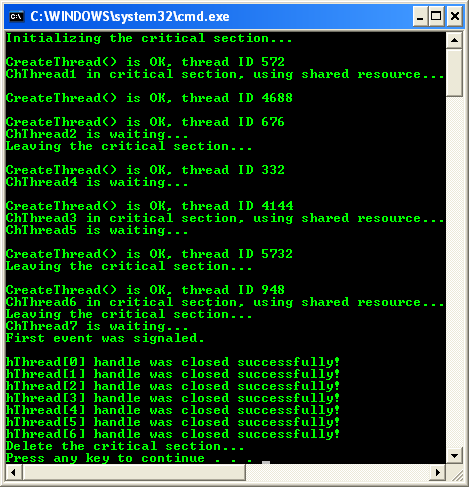Windows Thread Synchronization 29
More Critical Section Program Examples
Create a new empty Win32 console application project. Give a suitable project name and change the project location if needed.

Then, add the source file and give it a suitable name.

Next, add the following source code.
// Program example which all the threads attempt to enter the critical section of code
// If they can not enter, they just printout that they are waiting to enter the critical section code.
#include <windows.h>
#include <stdio.h>
// Global variable
// The critical section object
CRITICAL_SECTION criticalSec;
///////////// Thread Main ///////////////////////
void ThreadMain(char *name)
{
// Attempts to enter a critical section without blocking.
// If the call is successful, the calling thread takes ownership of the critical section
// If the critical section is successfully entered or the current thread already
// owns the critical section, the return value is nonzero.
// If another thread already owns the critical section, the return value is zero.
if(TryEnterCriticalSection(&criticalSec) == 0)
{
wprintf(L%S is waiting...\n, name);
}
else
{
// critical section is mine...
wprintf(L%S in critical section, using shared resource...\n, name);
// Use the shared resource here...
// Releases ownership of the specified critical section object.
// Enabling another thread to become the owner and gain access to the protected resource
// The thread must call LeaveCriticalSection once for each time that it entered the critical section
// This function does not return a value.
wprintf(LLeaving the critical section...\n);
LeaveCriticalSection(&criticalSec);
}
}
/////////////// Create A Child//////////////
HANDLE CreateChildTh(char *threadNum)
{
HANDLE hThread;
DWORD dwId;
hThread=CreateThread(NULL,0,(LPTHREAD_START_ROUTINE)ThreadMain,(LPVOID)threadNum,0,&dwId);
if(hThread != NULL)
{
wprintf(L\nCreateThread() is OK, thread ID %d\n, dwId);
return hThread;
}
else
{
wprintf(LCreateThread() failed, error %d\n, GetLastError());
return NULL;
}
}
////////////////////Main (process & thread)////////////////////
int wmain(void)
{
DWORD i;
DWORD dwEvent;
HANDLE hThread[7];
wprintf(LInitializing the critical section...\n);
InitializeCriticalSection(&criticalSec);
hThread[0]=CreateChildTh(ChThread1);
hThread[1]=CreateChildTh(ChThread2);
hThread[2]=CreateChildTh(ChThread3);
hThread[3]=CreateChildTh(ChThread4);
hThread[4]=CreateChildTh(ChThread5);
hThread[5]=CreateChildTh(ChThread6);
hThread[6]=CreateChildTh(ChThread7);
// Waits until one or all of the specified objects are
// in the signaled state or the time-out interval elapses.
dwEvent = WaitForMultipleObjects(7,hThread,TRUE,INFINITE);
switch (dwEvent)
{
// hThread[0] was signaled
case WAIT_OBJECT_0 + 0:
// TODO: Perform tasks required by this event
wprintf(LFirst event was signaled.\n);
break;
// hThread[1] was signaled
case WAIT_OBJECT_0 + 1:
// TODO: Perform tasks required by this event
wprintf(LSecond event was signaled.\n);
break;
// hThread[2] was signaled
case WAIT_OBJECT_0 + 2:
// TODO: Perform tasks required by this event
wprintf(LThird event was signaled.\n);
break;
// hThread[3] was signaled
case WAIT_OBJECT_0 + 3:
// TODO: Perform tasks required by this event
wprintf(LFourth event was signaled.\n);
break;
// hThread[4] was signaled
case WAIT_OBJECT_0 + 4:
// TODO: Perform tasks required by this event
wprintf(LFifth event was signaled.\n);
break;
// hThread[5] was signaled
case WAIT_OBJECT_0 + 5:
// TODO: Perform tasks required by this event
wprintf(LSixth event was signaled.\n);
break;
// hThread[6] was signaled
case WAIT_OBJECT_0 + 6:
// TODO: Perform tasks required by this event
wprintf(LSeventh event was signaled.\n);
break;
case WAIT_TIMEOUT:
wprintf(LWait timed out...\n);
break;
// Return value is invalid.
default:
wprintf(LWait error %d\n, GetLastError());
ExitProcess(0);
}
wprintf(L\n);
for(i = 0;i<7;i++)
{
if(CloseHandle(hThread[i]) != 0)
wprintf(LhThread[%i] handle was closed successfully!\n, i);
else
wprintf(LFailed to close the hThread[%i] handle! Error %d\n, i, GetLastError());
}
wprintf(LDelete the critical section...\n);
DeleteCriticalSection(&criticalSec);
return 0;
}
Build and run the project. The following screenshot is a sample output.

< Thread Synchronization 28 | Thread Synchronization Programming | Win32 Programming | Thread Synchronization 30 >